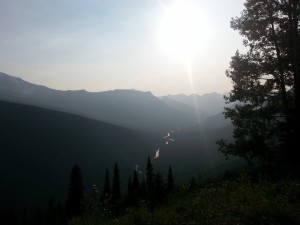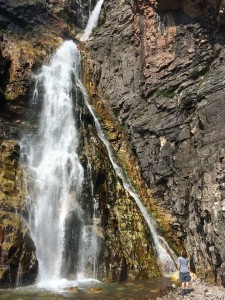In the fast pace of life—careers, graduate studies, families—it can be difficult to find moments that leave us with our jaws dropped and our hearts tuned to deeper things. Here, Beau Denton, Content Coordinator and second-year student in the MA in Counseling Psychology program, writes about the gift of wonder and the risk of exchanging it for safety and routine.
“The world is charged with the grandeur of God.
It will flame out, like shining from shook foil.”
—Gerard Manley Hopkins
It looked like something straight out of A River Runs Through It. My friend Charlie and I were on the last hour of our drive to Glacier National Park, and everything was perfect: the clear skies, the open windows, the highway curving lazily along Montana’s Flathead River, and the mountains looming ahead. Eventually the river peeled away, and we were surrounded by a wide open field that was, at this near-dusk moment, positively golden in the sunlight.
We were both commenting on the beauty around us, contentment and anticipation mingling, when I added, mostly as a joke, “I’d like to see a bear running through this field right about now.” You can guess what comes next. Three or four minutes later, I caught a flash of movement in the corner of my eye. I don’t remember exactly what I said as I hit the brakes—probably something along the lines of “Bear! Bear! Bear!” We stopped in time to see a mama bear running through the field with two cubs, crossing the road behind us in a hurry, then disappearing over a hill on the other side.
Everything about that moment—being in exactly the right place at exactly the right time, the lumbering grace of the bears, the fact that I had pre-described it and then laughed it off as an impossibility—left me in a state of awe.
 And that was only the beginning. The next couple of days were filled with stunning panoramic views, ice-cold swims in rivers and glacial lakes, and stars beyond number. I’ll never forget the way the Apikuni Falls charted their jagged course, nor how the distant Saint Mary River wove a golden thread through the mountains in the fading sunlight. On our second day in the park, wandering in a grove of ancient, towering cedars, Charlie and I talked about the capacity for wonder and the ability to walk through life with open eyes and open hearts.
And that was only the beginning. The next couple of days were filled with stunning panoramic views, ice-cold swims in rivers and glacial lakes, and stars beyond number. I’ll never forget the way the Apikuni Falls charted their jagged course, nor how the distant Saint Mary River wove a golden thread through the mountains in the fading sunlight. On our second day in the park, wandering in a grove of ancient, towering cedars, Charlie and I talked about the capacity for wonder and the ability to walk through life with open eyes and open hearts.
It’s an easy enough thing to ponder when you’re surrounded by mountains and waterfalls and there are bears dashing across the road. That’s why we go to national parks, after all—so that wonder can slap us in the face and remind us that the world is big and beautiful.
But maybe the true gift of wonder is that it is always within reach, waiting for us to notice. And maybe that’s why Jesus directed so much attention to little children; we have a lot to learn from their curiosity and wide-eyed glee. Somewhere along the way, we lose that. Routine, stress, busyness, smartphones, self-consciousness—so many things dull our attentiveness, to the point that we travel to remote locations and climb mountains to be reminded of what we’ve lost.
 What if we don’t have to leave? What if, with just a bit of curiosity and openness, we can experience that national park awe and childlike wonder right where we are? Maybe it’s nestled against a fence in the form of weeds that turn out to be a blackberry trove. Maybe it’s in one of those epic, hours-long sunsets that Seattle is so good at this time of year, or an unexpected glimpse of mountains through the clouds, or a song you’ve heard a thousand times that suddenly knocks the wind out of you.
What if we don’t have to leave? What if, with just a bit of curiosity and openness, we can experience that national park awe and childlike wonder right where we are? Maybe it’s nestled against a fence in the form of weeds that turn out to be a blackberry trove. Maybe it’s in one of those epic, hours-long sunsets that Seattle is so good at this time of year, or an unexpected glimpse of mountains through the clouds, or a song you’ve heard a thousand times that suddenly knocks the wind out of you.
Or maybe, more than any of this, wonder can be found in the people around us, each of them brimming with such glory, heartache, creativity, struggle, and beauty.
I am increasingly convinced that we are surrounded by more than enough to be moved to wonder every day—that it is not something we have to hunt for or leave town to find. Like David James Duncan writes, maybe wonder isn’t something we grab, but rather something that grabs us. And once we’re grabbed, we lose the ability to remain unchanged. The capacity to be surprised bleeds into the capacity to be transformed.
Gerard Manley Hopkins said it well: “What you look at hard seems to look hard at you.”
Attentiveness to wonder, though, is not without risk. When we are able to be moved, we are able to be wounded. This is especially true when it comes to other people, who can amaze and intrigue us more than anything else, but who can also betray and abandon us.
Perhaps our loss of wonder, then, goes beyond routine and busyness. Maybe we stop looking around because we do not want to be harmed. We look at our stories and see places where openness left us scarred, so we clench our fists, close our eyes, and resolve not to let it happen again. Childlike curiosity is replaced by caution and boredom.
That seems like the safer option at first, but the loss cannot be overstated. In hopes of avoiding pain, we suffocate the beauty, creativity, joy—and, of course, wonder—that once thrived within us. This is something I am learning from the folks I met in my first year at this school, some of the bravest, kindest people I have known. As they dare to let down their guards and wrestle with stories and ideas, willing to be awed and transformed, they are learning to create, heal, and speak truth in ways more profound than I have ever seen.
Here is a good place to start: learning to say “I don’t know” again and again, every day, so that our curiosity and questions lead us to new depths of beauty, truth, and goodness. It’s no coincidence that one of the historical meanings of the word sacrament is “a holy mystery.” The Catholic Church defines a sacrament as a visible form of invisible grace, a tangible sign of the mysteries of God. Perhaps the sacraments, then—like the bread and wine, or in our case the chimes at nine, noon, and three—are a gateway to wonder, an opportunity for us to marvel at and participate in the unending unknown.
May God give us eyes to see and ears to hear. In our work, our play, our relationships, our studies, and our worship, may we slow down, open our eyes, and tune our hearts to the rhythm of God that pulses through the world around us. And may we be surprised by what we find.

